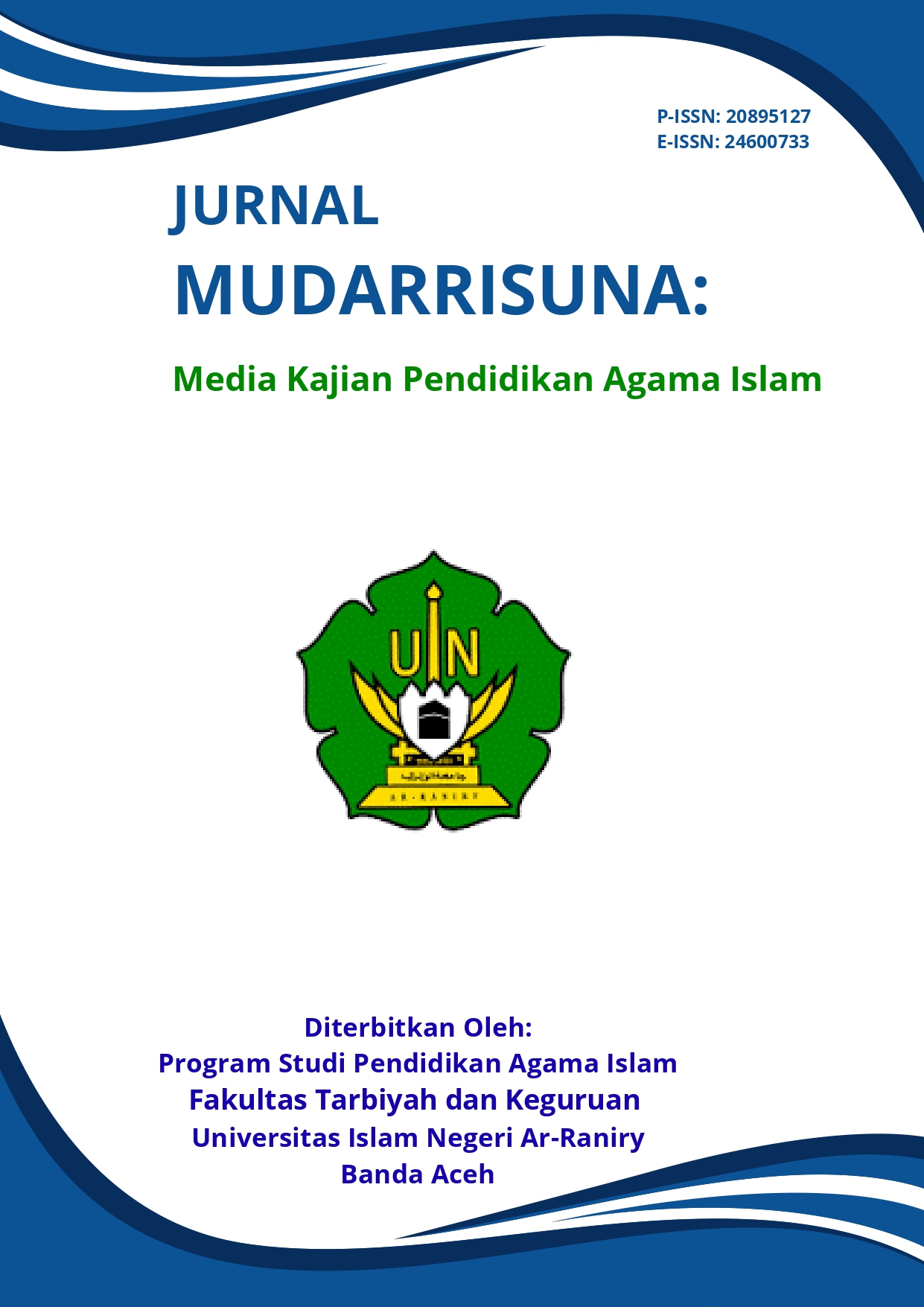The Effectiveness of Listening Team Learning Strategies to Improve the Results of class five in Fiqh Lesson at Islamic Boarding School Darussalam Gontor 2 for Female
DOI:
https://doi.org/10.22373/jm.v13i2.18268Keywords:
Effect, Fiqh, Listening TeamAbstract
Listening Team Strategy cooperative learning model that requires students to think critically, and each group has a different task. So, students can play an active role in expressing their opinions. The low average result in fiqh lesson (bidayatul mujtahid) of class five in Fiqh lesson (Bidayatul Mujtahid) of Islamic Boarding School Darussalam Gontor 2 for female shows that students do not understand the material as whole. Based on the description above, this research aims to: (1) Know the result before and after using the methode from Listening Team in strategy for the experimental class and (2) know the result before and after using conventional learning in the control class (3) to know the effectiveness of listening team strategy on learning outcomes (Bidayatul Mujtahid) of class five in Fiqh lesson at Islamic Boarding School Darussalam Gontor 2 for female. The type of research in this study is quantitative experiments using a quasi-experiment design, namely a nonequivalent control group design with the form of a pretest-posttest control group design. Test the initial and final tests in both classes. Based on the results of this study, researchers concluded that the Listening Team strategy effected to increase the learning outcomes of class five of Islamic teacher training college. Researchers hope that further research to deepen the learning tractor and improve student outcomes. It can help students to understand learning material, especially fiqh lesson.
References
Andika, M., Nufus, N., & Fadilah, A. N. (2022). Pemikiran Ibn Rusyd Tentang Wadiah Dalam Kitab Bidayatul Mujtahid. At-Ta’awun : Jurnal Mu’amalah dan Hukum Islam, 1(1), Article 1. https://doi.org/10.59579/atw.v1i1.2702
Apdelmi, A. (2019). Penerapan Model Pembelajaran Listening Team Untuk Disiplin Siswa Pada Mata Pelajaran Sejarah Di Sma Negeri 2 Kerinci. HISTORIA: Journal of Historical Education Study Program, 4(1), Article 1. https://doi.org/10.33373/j-his.v4i1.1723
Apriantoro, M. S., Sekartaji, S. I., & Suryaningsih, A. (2021). Penyelesaian Sengketa Kepailitan Ekonomi Syariah Perspektif Ibnu Rusyd Al-Qurthubi Dalam Bidayatul Mujtahid Wa Nihayatul Muqtashid. Jurnal Ilmiah Ekonomi Islam, 7(3), Article 3. https://doi.org/10.29040/jiei.v7i3.3357
Buku Fiqih Kelas 1 KMI (K.H Imam Zarkasyi). (1415). Trimurti Press.
Herana, H., Patahuddin, P., & Jumadi, J. (2020). Peningkatan Motivasi Belajar Sejarah Melalui Metode Listening Group Berbantuan Video Pada Pembelajaran Sejarah Kelas XI IIS A SMA Negeri 5 Soppeng Tahun Ajaran 2019/2020. Attoriolong, 18(1), Article 1. https://ojs.unm.ac.id/Attoriolong/article/view/13713
Idrissi, K. (2017). منهج ابن رشد في عرض الآراء الفقهية من خلال كتابه بداية المجتهد ونهاية المقتصد: منهج ابن رشد في عرض الآراء الفقهية من خلال كتابه بداية المجتهد ونهاية المقتصد. International Journal of Fiqh and Usul al-Fiqh Studies, 1(1), Article 1. https://doi.org/10.31436/ijfus.v1i1.9
Khotimah, H., Sumiyati, S., & Nurjannah, N. (2017). Pengaruh Teknik Pembelajaran Listening Team Terhadap Hasil Belajar IPS Siswa. Jurnal Penelitian Dan Pengkajian Ilmu Pendidikan: E-Saintika, 1(1), Article 1. https://doi.org/10.36312/e-saintika.v1i1.1
MA, D. H. M. A. (n.d.). Fiqih Ibadah. GUEPEDIA.
Mansir, F. (2020). Urgensi Pembelajaran Fiqih dalam Meningkatkan Religiusitas Siswa Madrasah: Pembelajaran Fiqih. AL-WIJDÃN Journal of Islamic Education Studies, 5(2), 167–179. https://doi.org/10.58788/alwijdn.v5i2.538
Sugiyono. (n.d.). Metode Penelitian Kuantitatif Kualitatif dan R&D (Cetakan Ke-1 September 2019). ALVABETA, cv Hotline:081.1213.9484 Jl.Gegerkalong Hilir No. 84 Bandung.
Yogaskara, H., & Kurniawan, K. (2020). The Effect of Implementing Listening Teams Strategy on Students’ Critical Listening Ability. 291–296. https://doi.org/10.2991/assehr.k.201215.045
Downloads
Published
Issue
Section
License
Jurnal MUDARRISUNA: Media Kajian Pendidikan Agama Islam allows the author(s) to hold the copyright and to retain the publishing rights without restrictions. Authors who publish in this journal agree to the following terms:
- Authors retain copyright and grant the journal right of first publication with the work simultaneously licensed under a Creative Commons Attribution-ShareAlike 4.0 International License that allows others to share the work with an acknowledgment of the work's authorship and initial publication in this journal.
- Authors are able to enter into separate, additional contractual arrangements for the non-exclusive distribution of the journal's published version of the work (e.g., post it to an institutional repository or publish it in a book), with an acknowledgment of its initial publication in this journal.
- Authors are permitted and encouraged to post their work online (e.g., in institutional repositories or on their website) prior to and during the submission process, as it can lead to productive exchanges, as well as earlier and greater citation of published work.




